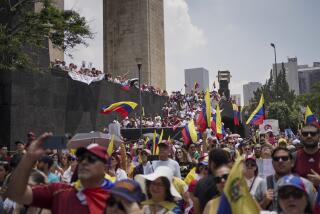Anti-Sandinista March Held by Broad Coalition
- Share via
MANAGUA, Nicaragua — After six months of government-imposed quiescence, Nicaragua’s civic opposition returned to the streets Sunday with a spirited but peaceful march by 4,500 people representing the broadest coalition of anti-Sandinista forces ever gathered.
The turnout was less than half of what opposition leaders had hoped for. But they said that the march, which drew Communist factory workers, right-wing businessmen and activists of 13 political parties, was the first step toward building a united opposition bloc for next year’s general elections.
Behind a multicolored row of party flags, the marchers filed 17 blocks through the hot narrow streets of two working-class neighborhoods. Banners and shouted slogans announced long-held grievances against the revolutionary government: militarism, political prisoners, hyper-inflation, wage restrictions and poverty.
Symbolic Coffin Burned
As the march ended just outside the city’s cemetery, several youths burned a black box symbolizing a Sandinista coffin, then spit on it.
For more than a year, opposition parties have pressed a common agenda of constitutional reforms that would ease the Sandinistas’ grip on political power. But Sunday was the first time they had joined together, not only among themselves but also with the anti-Sandinista business chamber and all four dissident union federations, to measure their combined forces.
“Today is a historic day for Nicaragua,” Miriam Arguello, president of a Conservative Party faction, told the marchers from the back of a pickup truck. “This is a starting point for the unity that has lain dormant so long because many of us were afraid.”
Arguello was among 38 Nicaraguans jailed after a protest rally July 10 in Nandaime, a town south of Managua, turned violent. A sharp crackdown on that rally, after the collapse of peace talks with U.S.-backed Contras, ended 10 months of relative freedom for anti-Sandinista groups.
Restrictions Eased
Hoping for new peace talks after President-elect Bush takes office, the Sandinistas have eased political restrictions in recent weeks. They freed the last of the Nandaime prisoners in December and gave opposition leaders the required permit to march Sunday. The police kept their distance and did not wear riot gear.
However, the government did move to keep people away from the march. As soon as the march time was set, the Sports Ministry arranged a baseball game in Managua between national all-star teams for the same hour. Thousands of tickets were given away and the game was televised live.
Both pro-government newspapers reported in recent days that the U.S. Embassy had given $25,000 to six conservative opposition leaders to pay their followers in the march. The embassy and the politicians denied the story, and leftist participants in the march dismissed it as an attempt by the government to sow dissension among its foes.
March Called ‘Total Failure’
The official Voice of Nicaragua radio called the march “a total failure,” and opposition leaders admitted disappointment with the turnout. They said Sandinista authorities denied permits that would have allowed private bus owners to transport marchers here from several provincial cities.
The occasion of the march was the 11th anniversary last Tuesday of the slaying of Pedro Joaquin Chamorro, a newspaper publisher and prominent foe of the Somoza family dictatorship. His assassination helped push Nicaragua toward revolution, and President Anastasio Somoza was toppled 18 months later.
A march on the 10th anniversary of Chamorro’s death--held in an atmosphere of somewhat greater political freedom--drew about 10,000 people. It was sponsored by the Nicaraguan Democratic Coordinator, a conservative coalition representing about half the forces assembled Sunday.
Chamorro’s Widow Active
One leader who worked to broaden the demonstration was Violeta Barrios, Chamorro’s widow and successor as publisher of La Prensa. After serving in the first post-Somoza junta, she turned against the Sandinistas.
“Pedro always believed that opposition unity was indispensable for getting rid of the Somoza tyranny,” she told the crowd Sunday. “We are in the same situation today.”
Father Bismarck Carballo struck the same theme in his homily at a memorial Mass before the start of the march, as did several speakers along the route.
“This is the moment to ask the Virgin Mary and Jesus to help us work together,” he said. “In unity there is strength.”
Eli Altamirano, the Communist Party’s leader, called for “a government of national salvation” made up of opposition groups.
‘Common Cause’ Cited
“Many people think this is ridiculous because of the contradictions among us,” he said. “They forget the common cause of those who are tired of military dictatorship, war, ruin and misery.”
In recent months, visiting U.S. congressmen and European political leaders have urged anti-Sandinista groups to work together. Opposition leaders said they met for several weeks before overcoming differences about who would march where and who would deliver the six main speeches.
“We had some agitated clashes over ambitions and egos,” said Mauricio Diaz, head of the Popular Social Christian Party. “Some of us have not spoken to each other in years. We are starting to mature as an opposition, but it will still be a while before we can turn into an electoral front.”
Need for Single Slate
While agreeing that the task will be difficult, several other politicians said they are convinced of the need to field a single opposition slate in the November, 1990, election, when it is presumed that President Daniel Ortega will seek reelection as the Sandinista candidate.
Ortega won election in 1984 over six opposition candidates. The Democratic Coordinator, the most powerful opposition group, boycotted that election, charging that the rules favored the Sandinistas.
“The opposition has to look for ways to keep mobilizing people against the Sandinistas, then we can worry about who will be the candidate,” said Erick Ramirez, a Social Christian Party leader with presidential ambitions.
More to Read
Sign up for Essential California
The most important California stories and recommendations in your inbox every morning.
You may occasionally receive promotional content from the Los Angeles Times.












